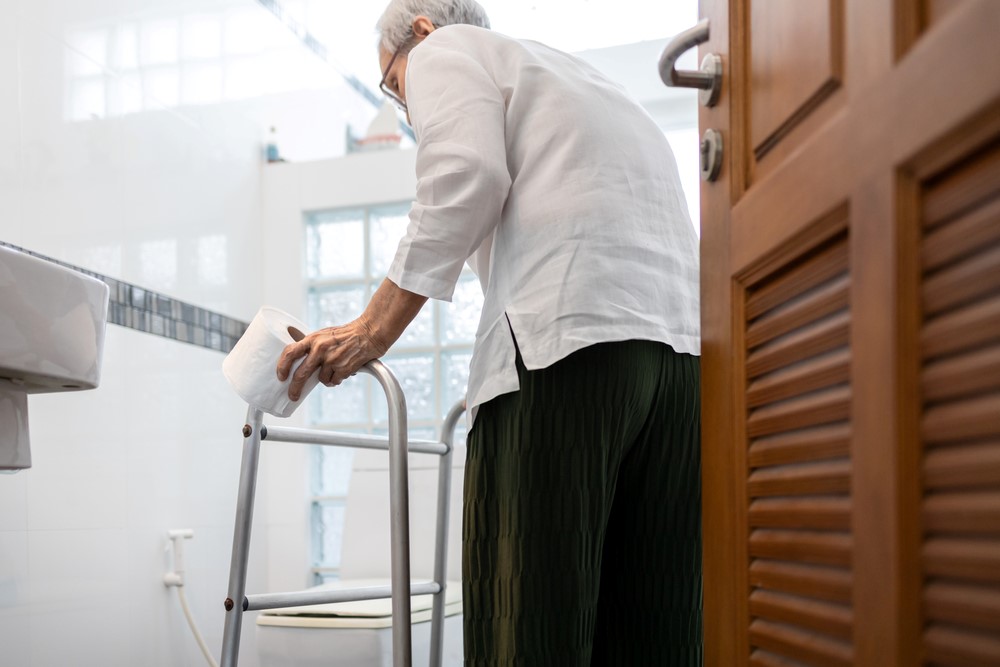
Caregivers often find themselves dealing with age-related gastrointestinal problems such as IBS, bacterial infection, constipation, and diarrhea. While the metabolism appears to slow with age, an active digestive tract is still incredibly important. When things stop moving, the situation quickly becomes uncomfortable and even dangerous.
Although most people would rather not talk about their bowels, long term constipation in seniors can cause major health issues such as fecal impaction, anal fissures, hemorrhoids, and bowel incontinence.
While most people experience constipation from time to time, the problem is particularly common for seniors. In fact, around 50% of nursing home residents may experience chronic constipation, along with plenty of seniors who live at home.
Modern diets and lifestyles are partly responsible for constipation, including too much alcohol, smoking, junk food, and overeating.
These aren’t the only factors though. Constipation in seniors can also be caused by dehydration, health conditions, medication, stress, and poor bathroom habits.
Constipated individuals often experience bloating and discomfort from difficult bowel movements. They may even go days without having a bowel movement – a situation that can quickly get painful.
What Are These Effective Home Constipation Remedies?
You might only need to make a few lifestyle changes or turn to homemade cures to get rid of intermittent constipation. Here are some quick remedies to get their system functioning normally again:
1. Talk To Their Doctor
Talking to the senior’s doctor should always be your first step, especially if constipation is chronic. They’ll be able to offer suggestions for how to remedy the constipation while also telling you what is safe and realistic for the senior.
After all, we’re all different, so the best solution for one person might not be wise for someone else.
The doctor may also help you determine the underlying cause of constipation. In many cases, this may be a medication side effect. If this is so, the answer may be as simple as changing some medications.
2. Grab Some Coconut Oil!
Many people claim that consuming one or two tablespoons of coconut oil daily may help lubricate the intestines, having a laxative effect. In turn, this might assist in avoiding constipation.
Consult your doctor to see if you may use this treatment – as coconut oil isn’t always suitable.
There are alternative methods to incorporate coconut oil into your diet if the thought of swallowing a tablespoon of it turns you off. You might, for instance, add it to your morning coffee or blend it with vinegar to make a straightforward salad dressing.
3. Engage in Exercise Regularly
In a situation where you’re blocked up, you tend not to feel like hitting the gym, but a good exercise routine could provide you with that release you need.
Running or walking can assist in stimulating the muscles in your intestine. All kinds of exercise facilitate the easy passage of waste through the bowels.
Try to make exercise a routine as it aids in the relief and prevention of constipation. Aim for 100 minutes or more a week of moderate exercise (aerobic). This is similar to engaging in 30 minutes of aerobic exercises five days weekly.
Set a modest objective to start with if that feels like a lot for you. To stay healthy and free from constipation, try to engage in physical activity regularly.
Even seniors with limited mobility can engage in some activity. Doing so is important for reducing current constipation and lowering the risk of constipation in the future.
4. Grease it Properly
Coconut oil isn’t the only fat that may help with constipation. Olive oil, ghee, and caster oil can all have this effect in some situations.
Consuming the oil on an empty stomach may be the most powerful approach. This doesn’t work for everyone, but it’s certainly worth a try.
5. Get a Fiber Fix

A woman requires about 25 grams of fiber per day, whereas a male requires between 30 and 35 grams. Make sure the senior is getting enough fiber in their food to keep their digestive system on track.
Prunes are a famous dietary addition, as they are rich in fiber and also have a natural laxitive effect.
Another excellent technique to stimulate your system is raisins, as well as lentils, flaxseeds, chia seeds, oats and more. You can consume them as is, or you can smash them after soaking them in hot water. Getting plenty of vegetables is important too.
6. Keep Hydrated Regularly
Constipation can be prevented and treated with adequate hydration. It can facilitate digestion and prevent mucus from solidifying.
On average, as Health Reporter states, women should aim to drink nine cups of liquid each day, while men should aim for 13 cups. You might need to drink extra if you’re constipated. Consult your doctor for advice.
Although water is the best option, you shouldn’t disregard the advantages of other liquids. You can include beverages like green tea, black tea, coffee, and others in your regular fluid intake.
Getting seniors to drink enough water can be challenging, but caregivers have found many creative solutions to the problem.
7. Improve The Diet
Appetite and interest in food tends to decrease with age. Plus, many seniors live alone or have mobility challenges that make cooking difficult.
These factors can also lower the quality of a senior’s diet, leading to a reliance on convenience foods. Such foods are often low in fiber, so they raise the risk of constipation.
While seniors can take fiber supplements to offset this effect, improving their diet is much more powerful. This way they get all the nutrients they need and stay healthy.
Thankfully, there are many delicious healthy recipes for seniors that can keep them eating well. Seniors can also turn to meal kits or meal delivery services if they’re struggling to cook.
8. Laxatives – With Caution!
Laxatives are an option too. We’ve left these for last, as care needs to be taken with these.
In particular, some laxatives can cause significant damage, especially if they’re used frequently. It’s also possible to over-rely on laxatives, to the point that regular bowel movements become difficult.
As a result, it’s best to follow the other approaches on this list before turning to laxatives.
More Causes of Constipation in Seniors
Let’s dig a little more into the causes of constipation.
These are important, as it’s best to go beyond just treating constipation itself. You also need to address the reasons the senior is constipated to begin with.
Otherwise, the issue will keep returning.
Lifestyle
Slow digestion is greatly influenced by lifestyle factors like the kind of diet and the regularity of physical activities.
Unfortunately, many of these factors are commonplace for older persons. For instance, the elderly with mobility challenges and those who are either bedridden or require bed rest frequently engage in minimal physical exercise.
Seniors who aren’t bedridden will benefit from increased exercise, even if this is as simple as walking around the block or doing some chair yoga.
Dehydration
Research notes that older people don’t have a strong “thirst mechanism” and frequently experience dehydration covertly. For patients who have dementia and who often don’t drink enough fluids, this is a severe worry.
Dementia water balls can be used to improve matters. Water rich foods help as well, such as watermelon and soup.
Medical Conditions
Constipation can also be caused by a number of chronic medical disorders and the medical prescription drugs used to treat them. For example, ailments that impact levels of hormones or the nerves and muscles surrounding the colon can make it difficult to have regular bowel movements.
Infrequent urination can be brought on by hormonal imbalances brought on by diabetes, thyroid difficulties, Parkinson’s disease, multiple sclerosis, and stroke, as well as problems with the pelvic muscles.
Such issues are why talking to the senior’s doctor is so important. If their constipation is influenced by medication or a health condition, medical expertise may be needed to find a solution.
Conclusion
Try these at-home cures the next time your loved one starts to feel a little constipated. They can be all they need to restart their bowel movements.
Consult their doctor if these therapies don’t help or if you discover that they have chronic constipation. They might suggest a change in diet or medicine, among other remedies.
Chronic constipation can occasionally be brought on by another underlying medical problem. The senior’s doctor can assist you in determining and treating the issue.
This post contains a sponsored link
Feeling Overwhelmed?
Check out our Caregiving Consulting service for personalized support and guidance.

Leave a Reply